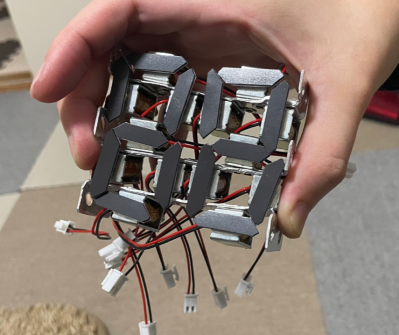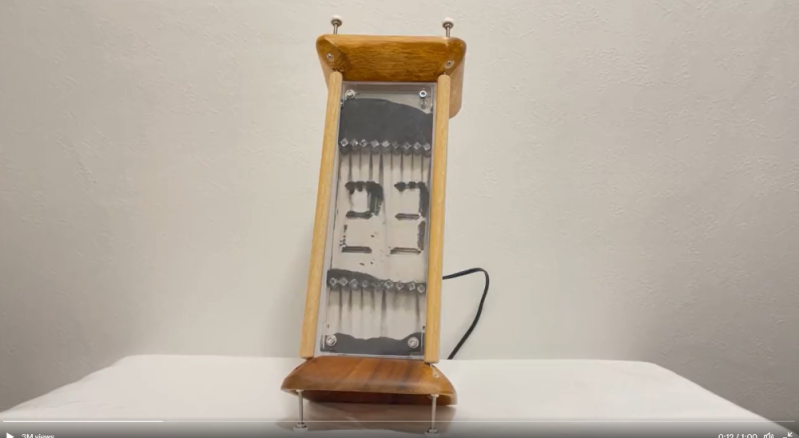If someone asked you to build a digital hourglass, what would your design look like? [BitBlt_Korry] took on that challenge, creating a functional art piece that hits it right on the nose: an hourglass with a digital display.
Iron filings fall between two pieces of plexiglass while ghostly numbers appear, counting down 30 seconds. Just as quickly as they appear, the numbers disappear – dropping down to the bottom of the enclosure. Each second is punctuated by what might be the loudest clock tick we’ve ever heard.
 Of course, it’s not all magic. The hourglass is controlled by a Raspberry Pi Pico running code in MicroPython. The pico drives a series of transistors, which in turn are used to control 14 solenoids. The solenoids serve double duty — first, they move pieces of flat “fridge magnet” material close enough to attract iron filings. Their second duty is of course provide a clock tick that will definitely get your attention.
Of course, it’s not all magic. The hourglass is controlled by a Raspberry Pi Pico running code in MicroPython. The pico drives a series of transistors, which in turn are used to control 14 solenoids. The solenoids serve double duty — first, they move pieces of flat “fridge magnet” material close enough to attract iron filings. Their second duty is of course provide a clock tick that will definitely get your attention.
Tilt sensors are the user input to the hourglass, letting the Pi Pico know which end is up when it’s time to start a new 30-second countdown.
[BitBlt_Korry] mentions that the hardest part of the project was setting the screws at the top and bottom of the hourglass to get the perfect uniform flow of iron filings.
[BitBlt_Korry] calls his creation “「時場(じば)」”. Google translates this to “Jiba”, which means “magnetic field”. We’re not native speakers, but we’re guessing there is a double meaning there.
This isn’t the first time we’ve seen humble iron filings stand up and dance at our command. If iron dust is too dry a topic, we’ve got plenty of ferrofluid projects as well!
















Extremely cool.
Well done.
Corny, dont like the clacking noise and not practical as it only count down
Yeah, it’s what a hourglass do, counting down.
You have no joy
Japan loves its puns.
“jiba” meaning magnetic field is “磁場”, with kanji that literally mean “magnet place”.
時 means time and 時計 means clock (neither pronounced “ji” in that context!), and 時間 (jikan) also means time. 時場 (jiba) is not a valid word, but it’s a pun on 磁場.
If I had to make up an equivalent English word, maybe “timenetic”, but that doesn’t reach the sort of punning that you can get from substituting a single kanji.
Also you should try jisho.org for single words (jisho means dictionary). Google is infamous for dodgy translations to and from Japanese, or rather I should say Japanese is infamous for being hard to translate.
Just use English ;) and all that dodgy stuff goes away :) .
That is a cool project though. Neat idea. Now he just needs a flipper to auto flip the box.
Yea … use the LOWEST COMMON DENOMINATOR (language) instead …
Otherwise it hurts tha brain to much …
/sarcasm_off
Just use Japanese ;) nothing dodgy about it! If you don’t speak any other languages, everyone else here is laughing at you 🤣
I would probably come up with “chronetic” or something. Still can’t reach the complexity of Japanese, where one can separate spelling and pronunciation for puns though
Thanks for the explanation. Cool pun.
That’s really cool. He could figure out some sort of guide fixture for the magnets to keep them aligned, though.
That is Really Cool!
Shame it doesn’t flip itself.
I’d make an elevator for the iron stuff and the 4 digits to make a clock…
I’d hardly call that loud just normal level. Sounds like a ping pong game in a small room. No tone to signal end of time. Top segments grow hair faster than the bottoms. Could this be done with electromagnets? Too much current to handle? Curvy segments like that Japanese Sharp calculator form early 70’s (which I passed up in a flea market once) would be possible perhaps even here with the PM segments.
I also wonder why using moving parts. The noise and the approach chosen make the result a little bit less cool than initially perceived.
I disagree, I think the mechanical nature leans into the kinetics inherent in a gravity driven clock. As for the sound: its a hourglass that ‘tick tocks’ which is awesome.
this is really amazing . I thought I had seen all the variations on mechanical seven segments and here comes another one! thanks for sharing it
Very cool.
It could be even better if the higher segments were flipped a few hundred milliseconds later to get a more uniform coverage of the number.
Its really nice, however also kind of weird using electro-magents to move permanent magnets.
If there only was a way to directly manipulate the magnetic field by currents ;)